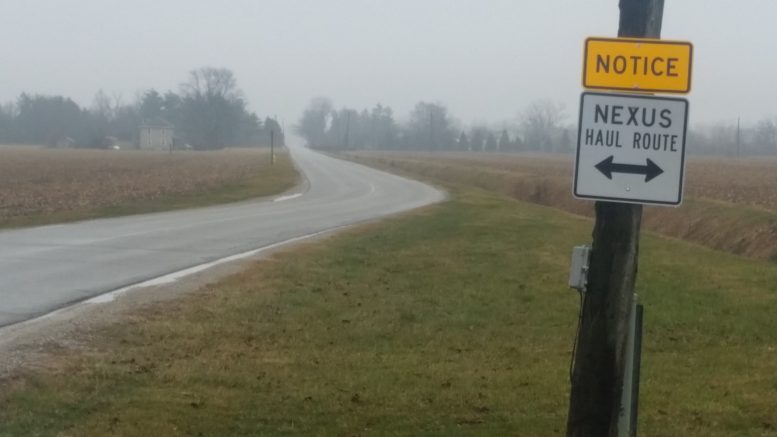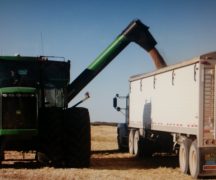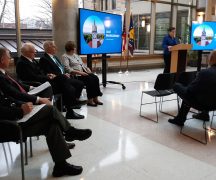By JAN LARSON McLAUGHLIN
BG Independent News
Wood County roads took a beating from the Rover pipeline construction across the southern part of the county.
So Wood County Engineer John Musteric wants to get an overweight truck program in place before more pipeline construction traffic rumbles over county roads and bridges.
But while the program will keep an eye on pipeline transports, it was decided that it won’t target farm traffic.
The Wood County Commissioners on Tuesday reviewed the proposed fees for an overweight truck program – with the ultimate goal of saving county roads and bridges from unnecessary wear and tear.
“This is to protect our assets,” Musteric said. “We’re spending a lot of money to improve these roads and bridges.”
At the same time, the engineer’s office is aware of many overweight loads using county roads and bridges.
“We hope to God a catastrophe doesn’t happen,” with older bridges being weakened with every heavy load, Musteric said.
The county has already posted signs notifying Nexus pipeline construction traffic of the route they are to take north of Bowling Green. The permit program will require the pipeline company to purchase permits for all of its trucks, and will allow the county to issue fines if the trucks stray from the assigned route that can better handle the heavy loads, Musteric said.
“They better stay on those routes. They’ve been warned,” Musteric said. “If you get off those routes, you will pay.”
The county learned a hard lesson from the Rover pipeline construction in the southern part of the county, Musteric said at a previous meeting.
“Rover tore the heck out of the roads,” he said.
Though the proposed overweight truck program has been unpopular with some, there are companies ready to pay for their permits, said Shane Johnson, of the county engineer’s office.
For Nexus pipeline, the program will require more than 85 permits at a proposed $150 each.
“They haven’t batted an eye,” Johnson said.
But local farmers don’t feel the same. The initial proposal by the county engineer’s office called for an annual blanket permit for farm equipment of $100 each year. While all the other fees mirror amounts charged by the Ohio Department of Transportation for overweight traffic, the farm fees do not.
The commissioners asked that the blanket farm fees be discarded.
“You don’t want to be the farm police,” Wood County Administrator Andrew Kalmar said.
Grand Rapids area farmer Dan Potter said there would not be a meeting room big enough for all the unhappy farmers if the county enacted blanket fees. He explained that ODOT exempts all farm equipment driving down the road from overweight fees.
No farm equipment weighs more than the maximum allowable weight of 80,000 pounds, Potter said
However, some semi-loads of grain may be overweight. But there is no way for farmers to determine the weight of the loads.
“We know that coming out of the field it’s impossible to tell,” Johnson said.
But Musteric said many farmers can tell if their tractors or trucks are struggling under a heavy load.
“They know when it’s overweight,” Musteric said. “I’ve got to believe they know when it’s overweight.”
Commissioner Craig LaHote suggested that the new overweight load program information be given to local grain elevators, so they can inform the farmers who bring in heavy loads.
The goal of the program is to redirect heavy traffic away from roads and bridges that are not able to handle the loads.
“This is really nothing new,” Musteric said. “All we’re trying to do is protect our assets. We know people are overloaded and they’re going across our load-limited bridges. We’re concerned, and the commissioners should be, too. It’s your assets.”
No permits will be required of traffic that is less than 80,000 pounds. But even traffic under the limit should be cautious about crossing some of the bridges in the county, Musteric said. Some have load limits far under 80,000 pounds, like one on Bays Road that has a 10,000 pound limit.
When permits are issued, the truck owners will have to identify their routes, and may be asked to change their routes to more appropriate roads.
The program will also allow the Wood County Sheriff’s Office to use portable scales from ODOT to weight loads suspected of being overweight.
“We’re going to use those to try to educate people,” Musteric said. The sheriff’s “ultimate goal is to not write any tickets.”
Musteric stressed, “This is not a money grab.”
The permit fees and fines will be used for road and bridge maintenance, Musteric said.
“It’s going to go into the pot,” he said.
The commissioners asked Musteric to track the revenue and show which road and bridge projects may get moved up with extra funding. The proposed fees will be fine tuned and presented to the commissioners for approval.





